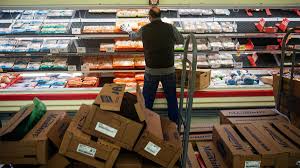
 Iowa farmer Bill Horan speaks at a recent conference.
Iowa farmer Bill Horan speaks at a recent conference.
One hundred miles from the nearest television station, near a town called Rockwell City, Iowa, farmer Bill Horan toils away, growing corn and soybeans like everyone else. And like everyone else, he hopes for spring rains and dry harvests to reap the bounty of the 4,500 acres of land he and his brother Joe work.
But Horan has an ace up his sleeve that sets him apart from every other American farmer — he's what's called a pharma farmer.
On a small fraction of his farm — about 40 acres, tops — Horan grows pharmaceutical crops. They consume the majority of his enthusiasm and attention, as well as most of the conversation I had with him recently at the Agricultural Media Summit in Kentucky. His 40 acres are the biggest collective plots of pharmaceutical crops in farmers' fields on the face of the earth. In the U.S., only eight permits were granted last year to grow such crops, and the Horans had two — the others are held by pharmaceutical companies.
The Horans have developed this interest into a lucrative niche; while other farmers sell their commodities by the tonne or pound, the Horans sell their pharmaceutical harvests by the gram.
Pharmaceutical crops, which yield such gems as lactoferrine to be used for cancer treatment (by boosting the immune system, during chemotherapy) and canine lipase, for treating cystic fibrosis, are protein-based medicines. They're extracted from genetically modified corn and barley plants, which most farmers can grow, because farmers know how to grow protein. Pharmaceutical companies need farmers' agronomic knowledge to produce these crops in commercially viable quantities; agriculture is not a profession the companies are trained in.
And likewise, pharmaceuticals were not traditionally on Horan's radar screen, either. But as a business person, he looked around at what almost everyone else was doing — that is, growing conventional corn and soybeans — and realized he needed a point of differentiation to make more than the U.S. government pays farmers to grow corn and soybeans.
So, he did some research. He learned that biotechnologists were quietly squirreled away in laboratories all over the world, including the University of Guelph, developing prototype plants that could be engineered to produce beneficial, highly valuable products in their leaves. These, then, could be harvested, the products extracted and refined, and eventually turned into medicine.
That's the way Horan sees it. He raises crops, but those crops produce medicine.
Through his research, he identified biotechnology companies he thought could use the services of a progressive farm community such as Rockwell City, a low-profile locale where leading-edge crops could be grown without great fanfare, outside the glare of TV lights and beyond the scrutiny of those philosophically opposed to biotechnology.
His biggest challenge, though, was yet to come — that is, in his words, "showing you can do it when you haven't done it." And that wasn't restricted to just growing crops. It encompassed everything from financing and accounting to municipal and political support.
His initial target was a biotechnology company in France. He doubted, though, he could swing a deal unless he got company officials to visit Iowa, see the community and his operation. But he also knew it would take more than a phone call or written invitation to get them to America.
Given the stakes, he decided to go big. He assembled a business team consisting of himself and his brother, an accountant, a banker, a university researcher, a local economic development specialist and the Majority Leader of the Iowa Senate, commissioned a 40-minute video on Iowa, and headed for the City of Light.
It worked. The French company was impressed enough by the Americans' business-like demeanour and enthusiasm that it came to Iowa to check it out. That was seven years ago. Finally, in 2001, the groups became partners and signed a production deal . . . ironically, remembers Horan, just as the World Trade Centre was being attacked.
Horan says other farmers could get involved if they are committed to showing companies the same kind of passion, developing a relationship with a company and dealing with the unending bureaucracy that accompanies new technology. It's the farmer who has to deal with the repeated and necessary visits from inspectors, who has to document absolutely everything that happens (or doesn't) in the plot and who has to produce the crop with unprecedented precision.
But to Horan, it's better than settling for government payments.
Owen Roberts teaches agricultural communications at the University of Guelph.



